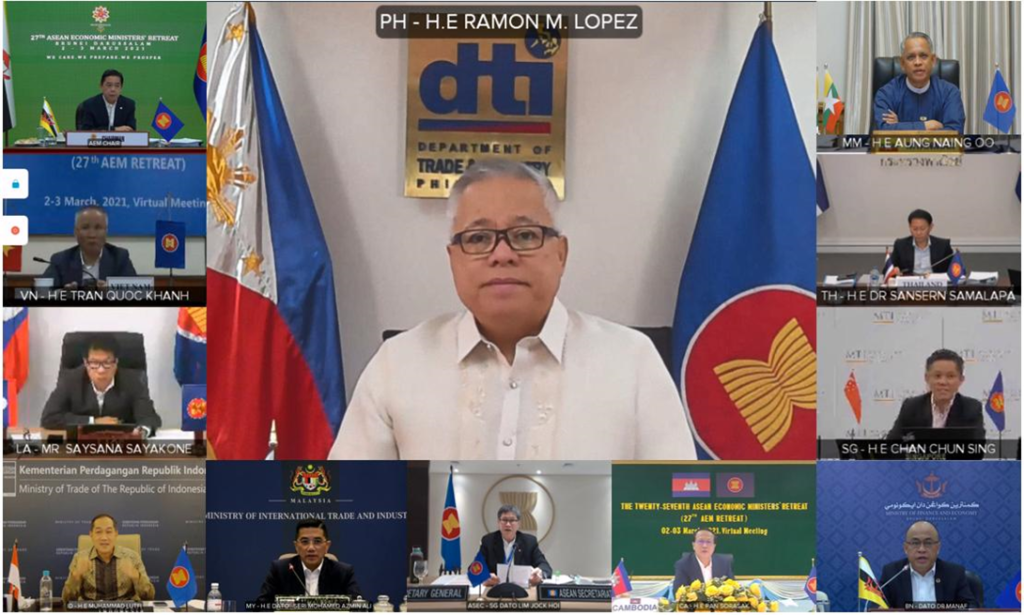
Economic Ministers from the 10 ASEAN Member States (AMS) met through video conference on 2-3 March 2021 to discuss implementation of initiatives that will further the region’s post-pandemic economic recovery efforts.
As this year’s ASEAN Chair, Brunei Darussalam leads the setting of their priority economic deliverables (PEDs). These focus on three strategic thrusts—Recovery, Digitalization, and Sustainability.
“We see the value of the identified PEDs especially in enhancing and complementing existing ASEAN initiatives, especially towards economic recovery efforts. The plan is to have these initiatives realized within the year, as they will significantly contribute to ASEAN’s regional integration,” said Department of Trade and Industry (DTI) Secretary Ramon Lopez.
The ASEAN Comprehensive Recovery Framework (ACRF) aims to deepen further regional economic integration under the framework of the ASEAN Economic Community Blueprint 2025.
Sec. Lopez also shared the country’s ongoing efforts to support post-pandemic recovery. “The Philippines, in support of the ACRF, will continue to implement policies and programs that will provide business friendly ecosystem, build a more conducive investment environment, enhance an ecosystem for innovation, and develop market opportunities.” he stated.
In line with the implementation of the Memorandum of Understanding (MOU) on the Implementation of the Non-Tariff Measures (NTMs) signed by ASEAN at the sidelines of the 37th ASEAN Summit in November 2020, Ministers also tasked Senior Economic Officials to work on
the expansion of the ASEAN List of Essential Goods with the view to include food and agricultural products to the current list of medicines and medical supplies and equipment – as necessary goods in combating the COVID-19 pandemic, on which the NTMs must be minimized.
The MOU urges member states to refrain from implementing unnecessary trade measures that may affect the movement of these goods. Moreover, it calls on them to facilitate timely information sharing among Member States on any trade-related measure applied to the aforementioned essential goods and supplies.
The Trade Secretary stressed the need to expand the List of Essential Goods especially the inclusion of staple food such as rice, adding: “It is imperative for ASEAN to show to our stakeholders that Member States are determined to ensure the smooth flow of these essential goods in these challenging times. In fact, even in normal circumstances, it is incumbent upon Member States to refrain from implementing unnecessary non-tariff trade measures.”
The Trade Ministers also engaged with the ASEAN Business Advisory Council (ASEAN-BAC) to discuss COVID-19 initiatives of the private sector and their proposed areas for cooperation in 2021, such as in healthcare, MSMEs, and trade facilitation.

Before the end of the meeting, Ministers endorsed the List of 2021 AEC Annual Priorities that will further guide the work of ASEAN sectoral bodies in key areas—such as trade facilitation, e-commerce, and MSMEs—in ushering the region’s immediate recovery efforts from the pandemic.
Ministers also expressed commitment towards the entry into force of the RCEP Agreement as a means to encourage more investment in the region and a vital tool to integrate MSMEs into the Global Value Chain (GVC).
The 10 Member States of ASEAN is comprised of Brunei Darussalam, Cambodia, Indonesia, Laos, Malaysia, Myanmar, Philippines, Singapore, Thailand, and Viet Nam. The region’s total merchandise trade in 2019 amounted to USD 2.82T. The region also remains an important trading partner of the Philippines with its total trade with ASEAN amounting to USD 40.02B in the same period. ♦
Date of Release: 9 March 2021



